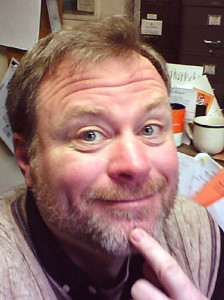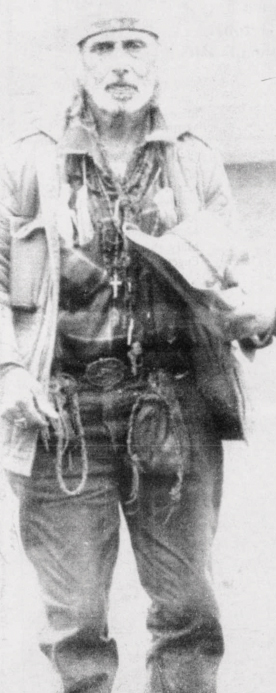
These days we seem to be an angry people, you see it every day. It’s easy to let frustrations spill out. So, sometimes it’s good to have something give you the figurative slap on the back of the head to get your thoughts straight. It was a great cosmic confluence of time and events which started me down the path of my memory and led me to where I would have never thought I’d go — all the way back to Indian Joe.
Though he died a little over 27 years ago at the age of 69, he was a legend to those of us around these parts in the 1970s-1990s. He used to stop by our office on M-24 almost weekly to talk. In 1990, I was inspired to actually interview him. Yeah, he could’ve used a bath and yeah, it was kind of hard to understand him, however, I actually took away something positive. That positive was something I’d forgotten until this past week when on social media someone posted, ‘Does anyone remember Indian Joe?’
I remembered the story from 1990, but then I remembered I wrote after his death a column. I looked it up, read it and found some lessons there for all of us. In part, here that column is.
June 29, 1994 — I would assume all of us want to be remembered … somehow, some way. To attain this goal we work hard. We strive not to be forgotten. Last week a man passed away who didn’t work at it, though he will be remembered by literally thousands of people. That man was Lee Clasman, a. k. a. Indian Joe.

My first recollection of Indian Joe was as a kid. All us kids knew of him. We saw him walking the streets. We saw him roaming the flea market at Dixie Highway and Telegraph roads. We saw him at the Pontiac Mall.
Rumors were he was a rich man who had a stash of money. The beads, the hats, the little pouch which carried his earthly belongings and the beard were all a ruse so people wouldn’t know.
That, of course, wasn’t true. From past research I learned Indian Joe may have had more Irish blood in his veins than Indian. Whatever he was, he was just a man who got tired of society. So, he wandered — everywhere, from Union Lake to Oxford and most places in between.
I talked to him for 30 minutes and he let me know what he thought. He was philosophical. And, maybe if you get right down to the nitty-gritty, he was some sort of philosopher. Most people, he said, were friendly to him, but society itself wasn’t friendly enough.
“I’m not knocking anyone’s religion,” he said. “I was brought up in the old Catholic way, the strict way. We helped each other. Nowadays, people are living too big. They drive their expensive cars and they’re not out helping people. Well, some are. People need to be kind to one another.”
It was kind of hard to hear what he said. He mumbled. So, I had to listen hard to the little old man who was unwashed and bent. He wanted to do things in “the Indian-way.”
“I do things God wants. People should remember the things God said. Don’t be greedy. It’s no good to be greedy.”
Some will say that would be easy for Joe. As he didn’t have anything and didn’t care to work for anything. I suspect he just wasn’t into the things we all want.
“I make every day count. I make the money last.”
It will be different now that Joe is gone. No longer will we be able to see him shuffling up and down the road. No more, “There’s Indian Joe.”
I got some flack from some of his family members for writing that 1990 article. They didn’t want “to encourage him.” Those were their words. How could you encourage Joe, I asked myself? He did what he wanted and, as far as I know, didn’t hurt anyone, except maybe his family name. I saw him on Telegraph Road about a week before he died. And, I guess I was surprised he lived as long as he did, the way he did.
He wasn’t a hero and I don’t want to make him out as one. But, I think he’s a local legend and there’s no embarrassment about that. I’ll end this column with some of the last things he told me that day.
“Life is good. I don’t think of disappointments. I think people should be happy, no matter how much money they’ve got. I think I’ve been chosen to tell people, big people and the children, not to fear. People fear too much. They think this is going to happen, or that is going to happen. Put fear out of your mind. Fear is not there unless you put it there.”
* * *
I don’t think Indian Joe would like what he would see today — a people so split over everything. I think he would still be shuffling up and down the highways and byways hoping and preaching, “People need to be more kind, that’s part of the Indian-way, too.”
My article on Lee “Indian Joe” Clasman ran in the Oct. 10, 1990, Oxford Leader. To that cosmic confluence, thanks for letting me remember Indian Joe — hopefully I’ll be a better man today and tomorrow because of it.
Via email, send your comments to DontRushDon@gmail.com

